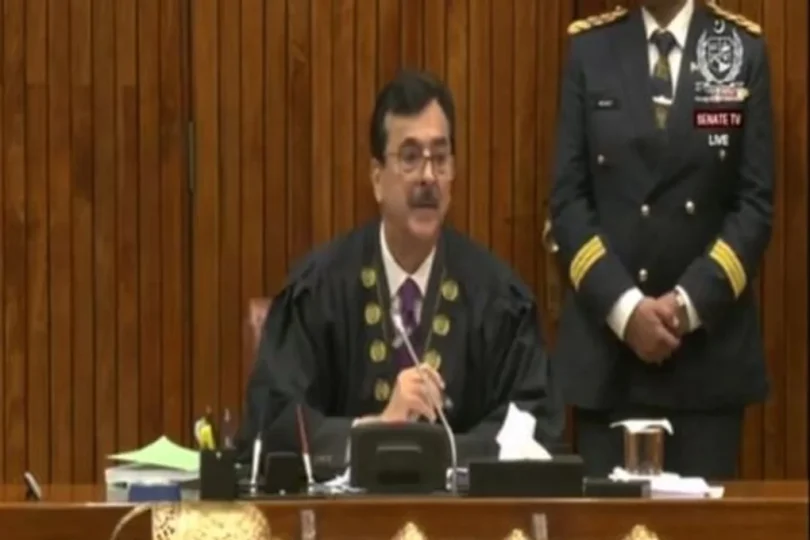Pakistan’s Senate approved on Thursday the 27th Constitutional Amendment bill, following its passage in the National Assembly with several changes and a two-thirds majority, despite strong protests from opposition lawmakers.
The session, chaired by Senate Chairman Yousaf Raza Gillani, took up the revised text of the amendment, which aims to restructure parts of Pakistan’s judicial and defense systems.
Sixty-four senators voted in favor of the amendments and four against them. A total of 59 clauses were passed by the Senate on Monday. The government has now added nine more clauses, which were approved by the National Assembly on Wednesday.
Those additional clauses returned to the Senate for approval today. Once the 27th Constitutional Amendment is passed by the Senate, it will be sent to the president of Pakistan for assent.
Army chief Field Marshal Syed Asim Munir will now be elevated to the new post of Chief of Defense Forces, placing the navy and air force under his command in addition to the army. After completion of his term, he will retain his rank and have legal immunity for life.
The lower house had approved the amendment a day earlier after an intense debate. The ruling coalition secured 234 votes in favor — 10 more than the 224 required to amend the Constitution.
Lawmakers from the Jamiat Ulema-e-Islam-Fazl (JUI-F) voted against the bill, while members of the opposition Pakistan Tehreek-e-Insaf (PTI) boycotted the proceedings and tore up copies of the bill in protest.
Extensive reforms
The 27th Amendment is one of the most extensive constitutional reform efforts in recent years. It establishes a new Federal Constitutional Court (FCC), adjusts the titles and hierarchy of top judges, and modifies several clauses concerning the military command structure and the presidency.
The version now before the Senate differs from the earlier draft approved by the upper house. It fine-tunes the structure of the proposed Federal Constitutional Court and removes several controversial provisions related to the oaths taken by constitutional officeholders.
One of the key revisions relates to Article 6(2A) of the Constitution, which deals with high treason. The updated text adds the “Federal Constitutional Court” to the article, explicitly bringing the new court under its jurisdiction.
Another change, a newly added Clause 2A, amends Article 10(4) on preventive detention to include a reference to the Supreme Court.
The National Assembly removed several clauses from the Senate’s earlier version that proposed changes to oaths taken by the president, auditor general, and chief election commissioner. Clauses 4, 19, 51, and 55 — which sought to replace references to the “Chief Justice of Pakistan” with “Chief Justice of the Federal Constitutional Court” — have all been deleted.
A new Clause 23 amends Article 176, clarifying that the current Chief Justice will continue to hold the title “Chief Justice of Pakistan” until the end of his term. Another addition, Clause 56, defines the “Chief Justice of Pakistan” as the senior-most among the Chief Justice of the Federal Constitutional Court and the Chief Justice of the Supreme Court, establishing a formal hierarchy between the two.
Prime Minister Shehbaz Sharif hailed the passage of the amendment, calling it a “historic step for democracy and national unity.” Speaking in the National Assembly, he said the creation of constitutional courts fulfilled a 19-year-old commitment and emphasized that the Chief Justice would continue to head key judicial bodies, including the Judicial Commission and the Supreme Judicial Council.
Sharif praised Pakistan’s security forces for their sacrifices against terrorism and said he would seek consensus with other political parties, including the PPP, on reforms to the 18th Constitutional Amendment and the National Finance Commission Award.
He added that the government would continue to uphold the Constitution and strengthen cooperation between the federation and the provinces.
tapmad Strengthens Regional Presence Through Partnership with Robi Axiata in Bangladesh







